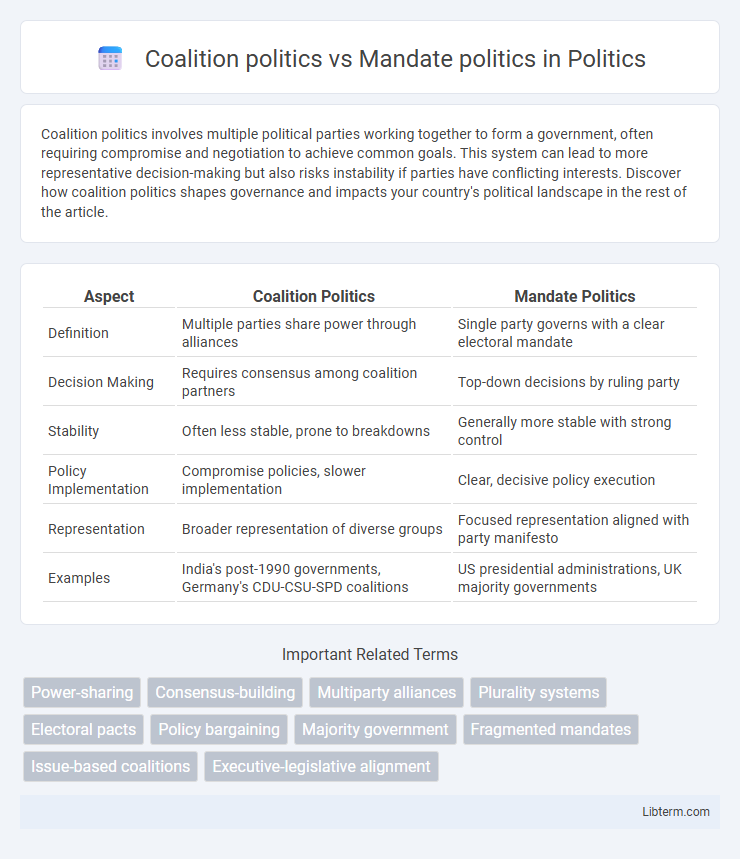Coalition politics involves multiple political parties working together to form a government, often requiring compromise and negotiation to achieve common goals. This system can lead to more representative decision-making but also risks instability if parties have conflicting interests. Discover how coalition politics shapes governance and impacts your country's political landscape in the rest of the article.
Table of Comparison
| Aspect | Coalition Politics | Mandate Politics |
|---|---|---|
| Definition | Multiple parties share power through alliances | Single party governs with a clear electoral mandate |
| Decision Making | Requires consensus among coalition partners | Top-down decisions by ruling party |
| Stability | Often less stable, prone to breakdowns | Generally more stable with strong control |
| Policy Implementation | Compromise policies, slower implementation | Clear, decisive policy execution |
| Representation | Broader representation of diverse groups | Focused representation aligned with party manifesto |
| Examples | India's post-1990 governments, Germany's CDU-CSU-SPD coalitions | US presidential administrations, UK majority governments |
Defining Coalition Politics
Coalition politics refers to the practice where multiple political parties collaborate to form a government, often due to no single party achieving an absolute majority. This system requires negotiation, compromise, and power-sharing among diverse parties to ensure stability and policy-making efficacy. Coalition politics contrasts with mandate politics, where a single party governs based on a clear electoral majority, enabling more centralized decision-making.
Understanding Mandate Politics
Mandate politics centers on a political party securing a clear majority in elections, providing a strong and direct authority to implement its policies without reliance on coalition partners. It emphasizes the legitimacy derived from a decisive electoral mandate, allowing for swift decision-making and coherent policy execution. This contrasts with coalition politics, where power is shared among multiple parties, often requiring compromise and negotiation to maintain governance stability.
Historical Context of Coalition and Mandate Politics
Coalition politics emerged prominently in post-World War II parliamentary democracies, where fragmented party systems necessitated alliances to form stable governments, exemplified by Italy's multi-party coalitions. Mandate politics gained traction in the late 20th century, reflecting a shift towards strong single-party governments claiming clear public endorsement, as seen in the United States under Franklin D. Roosevelt's New Deal. The evolution from coalition to mandate politics mirrors changes in electoral systems, voter behavior, and political party structures across different historical periods.
Key Differences Between Coalition and Mandate Approaches
Coalition politics involves multiple political parties sharing power, necessitating negotiation and compromise to form a government, whereas mandate politics centers on a single party gaining majority support and implementing policies based on a clear electoral mandate. In coalition systems, policy decisions often reflect diverse interests and require consensus, while mandate politics enables swift decision-making aligned with the ruling party's agenda. The stability of coalition governments can be less predictable compared to mandate-based governments, which typically possess stronger authority to enact their platforms.
Advantages of Coalition Politics
Coalition politics fosters inclusive governance by bringing diverse political parties together, which enhances representation and stability in multi-party systems. It encourages consensus-building and policy compromises, reducing the risks of authoritarianism and promoting democratic values. By distributing power among coalition members, it prevents dominance by a single party, leading to more balanced and responsive decision-making.
Challenges of Mandate Politics
Mandate politics face challenges such as limited flexibility in governance due to strict adherence to electoral promises and difficulty in addressing diverse public interests beyond the original campaign agenda. The concentration on a singular mandate often leads to polarization and reduced opportunities for consensus-building among various political stakeholders. This rigidity can hinder effective policy implementation and responsiveness to evolving socio-political dynamics.
Coalition Politics: Impact on Policy Making
Coalition politics significantly shapes policy making by requiring negotiation and compromise among diverse political parties, often leading to more moderate and inclusive policies. The necessity to accommodate multiple interests can slow decision-making but enhances the representation of varied social groups. This collaborative dynamic frequently results in policies that balance competing demands, fostering stability and broader consensus in governance.
Mandate Politics: Strengths and Weaknesses
Mandate politics emphasizes a clear electoral mandate where a single party governs based on its manifesto promises, ensuring policy consistency and decisive leadership. Its strengths include streamlined decision-making and accountability to voters directly tied to election outcomes. However, weaknesses arise from potential authoritarianism and reduced political diversity, risking alienation of minority voices and limited compromise in governance.
Case Studies: Coalition vs Mandate Government Outcomes
Coalition politics often result in more inclusive but sometimes unstable governance, as exemplified by India's frequent coalition governments that balance diverse party interests yet face challenges in policy consistency. Mandate politics, seen in Canada's 2011 Conservative majority government, enables decisive policy implementation but risks marginalizing minority voices and reducing political compromise. Case studies reveal coalition governments prioritize consensus and diversity, whereas mandate governments focus on clear accountability and streamlined decision-making.
The Future of Coalition and Mandate Politics
Coalition politics will increasingly shape governance as diverse societies demand inclusive representation, leading to complex power-sharing arrangements and policy compromises. Mandate politics, characterized by clear electoral promises and majority rule, faces challenges from polarized electorates and fragmented party systems, potentially reducing its effectiveness in stable governance. Future political landscapes may witness hybrid models blending coalition cooperation with mandate-driven decisiveness to balance inclusivity and accountability.
Coalition politics Infographic

 libterm.com
libterm.com